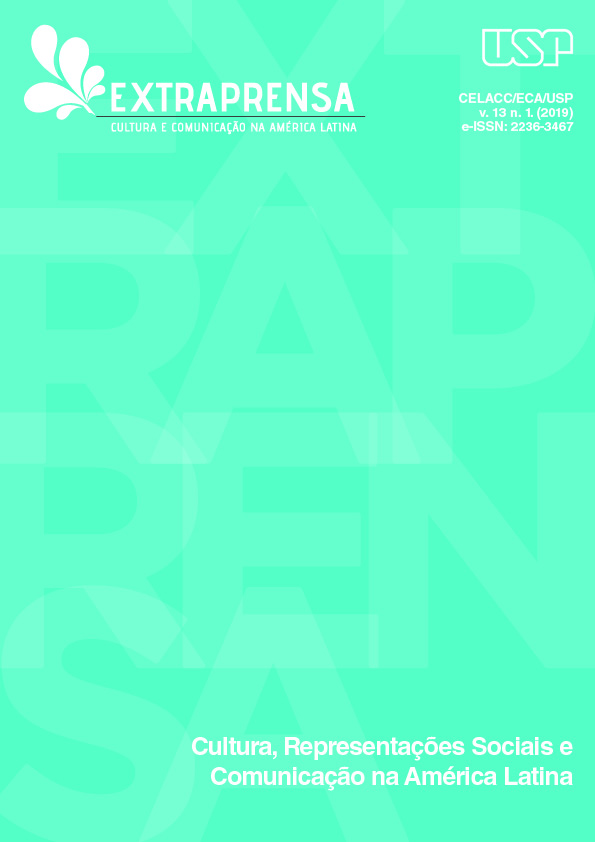The narratives about Brazilian natives in the world megaevents of the 21st century
DOI:
https://doi.org/10.11606/extraprensa2019.163795Keywords:
Mega-events, Representation, AmerindiansAbstract
International mega-events generally seek to convey a favourable narrative for the hosting nation and its people. In the case of Brazil, the organization of the 2014 FIFA World Cup and the 2016 Summer Olympics provided the country with a powerful media exposure able to retell the nation’s history within a two-year time-span. This paper sets an account on how the organizing committees of the aforementioned events represented the country’s first known inhabitants, the Amerindians, with the selection of different narratives built throughout Brazil’s intellectual history. This article uses a body of historical data to expose cultural movements and political events that lead to the understanding that part of Brazilian society as well as the aforementioned organizing committees has about Amerindians and their role in the nation’s construction.
Downloads
References
ALENCAR, José de. O Guarani. São Paulo: Ateliê Editorial, 2010.
ANDRADE, Oswald de. Manifesto Antropófago. Revista de Antropofagia, São Paulo, ano 1, n. 1, p. 3 e 7, maio 1928.
BARBUY, Heloisa. O Brasil vai a Paris em 1889: um lugar na Exposição Universal. Anais do Museu Paulista: História e Cultura Material, São Paulo, v. 4, n. 1, p. 211-261, 1996.
CARVALHO, Vinícius de. Brasil, um país do futuro: projeções religiosas e leituras sobre um mote de Stefan Zweig. Horizonte, Belo Horizonte, v. 5, n. 9, p. 30-42, 2006.
COMITÊ BRASILEIRO PARA PARIS 1867. L’Empire du Brésil a l’Exposition Universelle de 1867 à Paris. Rio de Janeiro: Typographie Universelle de Laemmert, 1867.
COMPAGNON, Olivier. L’adieu à l’Europe: L’Amérique latine et la Grande Guerre. Paris: Fayard, 2013.
CUNHA, Euclides da. Rebellion in the Backlands. Chicago: University of Chicago Press, 2010.
DEGREGORI, Carlos Iván. Ocaso y replanteamiento de la discusíon del problema indigena (1930-1977). In: DEGREGORI, Carlos Iván et al. Indigenismo, classes sociales y problema nacional: la discusión sobre el “problema indígena”. Lima: Ediciones Cetals, 1978. p. 227-251.
FREYRE, Gilberto. Casa-grande e senzala. Rio de Janeiro: Globo, 1933.
FREYRE, Gilberto. O mundo que o português criou: aspectos das relações sociaes e de cultura do Brasil com Portugal e as colônias portuguesas. Rio de Janeiro: José Olympio, 1940. v. 28.
GOBINEAU, Arthur. The inequality of human races. London: William Heinemann, 1915.
HALL, Stuart. The west and the rest: discourse and power. In: MAAKA, Roger; ANDERSEN, Chris. The indigenous experience: global perspectives. Toronto: Canadian Scholars’ Press, 1992. p. 165-173.
HEGEL, George. The philosophy of history. Kitchner: Batoche Books, 2011.
LARRAIN, Jorge. Identity and modernity in Latin America. Cambridge: Polity Press, 2005.
MALANSKI, Daniel. “Juntos num só ritmo”: FIFA World Cups of 1950 and 2014 as milestones of Brazil’s advances towards regional representation within Brazilian-ness. Sport in Society, Abingdon, v. 19, n. 10, p. 1518-1536, 2016.
MALANSKI, Daniel. Brazil 2014 and Rio 2016, in-between Mythological Amerindians narratives and the Tupi Alter-Modern Project. In: ALCÁNTARA, Manuela; GARCÍA MONTERO, Mercedes; LÓPEZ, Francisco Sánches. Antropología: memorial del 56º Congresso Internacional de Americanistas. Salamanca: Aquilafuente, 2018. p. 178-191.
MALANSKI, Daniel. Cannibals, colorful birds, and exuberant nature: the representation of Brazilian nationalism and its tropical modernity in the 2016 Rio Olympics. Journal of Sport and Social Issues, Thousand Oaks, 21 nov. 2019. Não paginado.
MIGNOLO, Walter. The idea of Latin America. London: Blackwell, 2005.
QUIJANO, Anibal. Coloniality of power and Eurocentrism in Latin America. International Sociology, Thousand Oaks, v. 15, n. 2, p. 215-232, 2000.
RIBEIRO, Darcy. O povo brasileiro: a formação e o sentido do Brasil. São Paulo: Companhia das Letras, 1997.
RODRIGUES, José Honório. Vida e história. Rio de Janeiro: Civilização Brasileira, 1966.
SANTOS, Myrian Sepúlveda dos. Museums without past, the Brazilian case. International Journal of Cultural Studies, Thousand Oaks, v. 6, n. 2, p. 180-201, 2003.
SCHUSTER, Sven. The World’s Fairs as spaces of global knowledge: Latin American archaeology and anthropology in the age of exhibitions. Journal of Global History, Cambridge, UK, v. 13, p. 69-93, 2008.
SCHWARCZ, Lilia Moritz. A Mestizo and tropical country: the creation of the official image of independent Brazil. Erlacs: European Review of Latin American and Caribbean Studies, Amsterdam, v. 80. p. 25-42, 2006.
SCHWARCZ, Lilia Moritz. O espetáculo das raças. Companhia das Letras: São Paulo, 2012.
SKIDMORE, Thomas. Brazilian intellectuals and the problem of race (1870-1930). Nashville: Vanderbilt University, 1969.
TREECE, David. Exiles, allies, rebels: Brazil’s Indianist movement, indigenist politics and the imperial nation-State. Westport: Greenwood Press, 2000.
VIEIRA, Antônio. Sermão do espírito santo. In: VIEIRA, Antônio. Sermões. São Paulo: Editora das Américas, 1957. v. 5, p. 205-255.
VIVEIROS DE CASTRO, Eduardo. A inconstância da alma selvagem. São Paulo: Cosac Naify, 2014.
VON MARTIUS, Karl Friedrich. Como se deve escrever a História do Brasil. Revista de História de América, Cidade do México, v. 42, p. 433-458, 1956.
ZWEIG, Stefan. Brasil, um país do futuro. Porto Alegre: L&PM, 2006.
Downloads
Published
Issue
Section
License
Ao submeter qualquer material científico para Extraprensa, o autor, doravante criador, aceita licenciar seu trabalho dentro das atribuições do Creative Commons, na qual seu trabalho pode ser acessado e citado por outro autor em um eventual trabalho, porém obriga a manutenção de todos os autores que compõem a obra integral, inclusive aqueles que serviram de base para o primeiro.
Toda obra aqui publicada encontra-se titulada sob as seguintes categorias da Licença Creative Commons (by/nc/nd):
- Atribuição (de todos os autores que compõem a obra);
- Uso não comercial em quaisquer hipóteses;
- Proibição de obras derivadas (o trabalho não poderá ser reescrito por terceiros. Apenas textos originais são considerados);
- Distribuição, exibição e cópia ilimitada por qualquer meio, desde que nenhum custo financeiro seja repassado.
Em nenhuma ocasião a licença de Extraprensa poderá ser revertida para outro padrão, exceto uma nova atualização do sistema Creative Commons (a partir da versão 3.0). Em caso de não concordar com esta política de Direito Autoral, o autor não poderá publicar neste espaço o seu trabalho, sob pena de o mesmo ser removido do conteúdo de Extraprensa.







